- Thursday, 19 February 2026
Social Modernisation And Party Transformation
Nepali society is undergoing a deep structural change. It is a change caused by multi-channel communication, multi-mode of learning and education, occupational shifts from agriculture and industries to service sectors, migration from rural to urban areas and abroad and technological revolution. This change is breaking the joint family system and cultural values and turning its duty-based society to rights-based, faith to reason and social stability to social mobility in search of improved prospects. Its impact is much deeper as Nepali society is shifting from hereditary to contractual ties with most institutions -- family, community, society and the state.
Nepali political parties, which emerged as oppositional democratic movements with an ideological course, are now beset by power imperatives and network bearing disconcerting effects on their functions. In the past, emotional solidarity had reduced the cost of politics. Now politics and elections have become high-cost owing to the decline of volunteerism and the bureaucratisation of party structures. Impulse to win re-elections and personal passion barely espouse the public interest. Democratic party-building in Nepal requires the congruity of means and ends, corresponding statutes, structures and leadership acting in the spirit constitution to gain power and execute programs.
Strategic loss
But Nepali leaders constantly face intellectual, political and strategic loss in meeting the lawful aspirations of people for public goods and freeing people from dependency. Resource deficits of the state impede the realisation of people’s needs and rights. Positive peace in Nepal still awaits the implementation of transitional justice and a transition from the state of nature to the rule of law applicable to all Nepalis irrespective of rank and distinction. Nepali political parties, which acted as a vehicle of freedom, social justice and representation of people, now face willful internal contradictions clustering around the top leaders and the political culture of cronyism they shaped.
Essential party functions are strained by demand-articulating civil society, boom of media, interest groups, federations, societies, unions and associations and even social movements that transcend the partisan and national frame with the propensity to link to global audiences and human rights. Erosion of ideology-generated volunteerism and the primacy of business interests of parties has made them catch-all. Irrespective of their varied identities, top leaders often enter into electoral and government coalitions and adjustments, which are steadily detaching cadres and voters from partisan attachment. It has stoked discontent and ruffled the emotions of various layers of opposition.
A coalition of opposites may be good for power-sharing but it dents democratic space for real parliamentary opposition, enfeebles useful checks on power, brings the crowd of minorities in the streets and renders the public sphere flimsy to debate on shaping good public policies informed by practical reason and public opinion. The paradox of Nepal’s party system is that every party is motivated to maximise its power while the nation demands their collective wisdom to move forward, not just scribble lurid words. The alleviation of the underlying challenges is central to party transformation in Nepal:
Safeguarding the soft state from toxic Agents: Social modernisation is a many-sided process. It bears transformative effects on the attitudes and institutions of parties. It sets free the dynamic forces of society and equalises people. In Nepal, one can see the erosion of traditional attributes of religion, caste hierarchy and patriarchy and the authority pattern of males. But the rise of civic and political figures has failed to eradicate the creeping feudalism in the parties. It has nurtured a culture of sullen conformity among the followers, not a critical sense of inquiry posing ethical questions. Nepali media often reveal the entanglement of top elites in scams and scandals beyond institutional means to heal and make party politics public.
The growing sway of money in Nepali politics has devalued the authority and legitimacy of politicians, even if they are elected. Social media has made its viewers critical of subduing habits, primitive passions and tribal loyalties. They have also offered wider views, participatory tools and solidarity keeping hope about nation building. It has honed the civic competence of Nepalis to judge about the state of state politics and question about falling institutional culture. Those imbued with civic competence aspires to realize not only their rights but also duties to the nation. The ability of social media to self-control is essential so that people can wield influence on leaders and enable Nepali state to impersonally promote public and national interests.
Communication as locus of modernisation: Political communication links Nepalis to a common information space and helps shape common background conditions. Democracy becomes vibrant if leadership is well-informed by the feedback of cadres and voters and accountable to their power. Critical audio, print and visible communication have politicised Nepalis and opened a choice about leadership and parties. The rising voice and visibility of the attentive public have unsettling effects on traditional parties while opening scope for the new ones of various sizes and hues.
They mobilise people based on issues. Nepali leaders, seduced more by self-image than eager to address the changing human condition, often communicate their messages through the show of crowd strength, not through party schools and social mobilisation for the promotion of democratic values, party programmes, and skills in leaders across diverse generations. Dispelling the cloud of distrust across generations and gender is likely if the rules of leadership transfer follow the principle of social inclusion espoused by the Nepali constitution.
The inseparability of political socialisation with concrete action can remove the pre-rational elements of society, which are obstacles to their modernisation. One bitter irony of Nepali politics is the mutual backstabbing of leaders, causing the atrophy of civic virtues. It has eroded political trust, vital for the execution of the constitution and the resolution of impending problems.
From leader-oriented parties to party-oriented leaders: Democratic political system thrives where parties are not personalised by top leaders. They are institutionalised with a predictable pattern of generational selection of leaders. Party functions are: aggregation of public interests, political education, representation, participatory policy making and articulation of people’s demands to uphold their ownership. Leaders alienated from the people and longing only for power and patronage lose their legitimacy and weaken the party’s ability for social and national cohesion.
Nepal has witnessed nonstop governmental instability and enfeebled governance. Constitutional bodies suffer from institutional erosion. Nepalis' abiding faith in leadership depends on the delivery of public goods, affirming the welfare state, not forcing the people to leave en masse. Civic leaders are entitled to fulfill public responsibility, initiate periodic social change, mediate rival interests and identities of society and mitigate political conflicts through peaceful dialogue. This helps restore the democratic credentials of leaders before the public's eyes, not superfluous. Independent scholars need to offer useful inputs for the solution of problems before they spiral out of control.
Shift from personalized decision-making to deliberative: As personality traits dominate party politics in Nepal, most of the high-stakes decisions are taken by them without consulting various layers of party committees. This tendency has a searing impact on the parties. Nepali leaders face a dilemma between the risks of anomie generated by anti-institutional agitations and the risks of the growth of authoritarianism. If Nepali parties have to shape a stable future, leaders have to abide by party statutes, democratic and constitutional principles and social standards to guide the choices of ordinary people.
Constitutional culture
To have broader legitimacy, decisions and actions of leaders must bear collective wisdom, democratic sensibility and constitutional culture. Political power is a call for public service. Its apt use can ease party structures to organise collective action and depolarise parties. In a diverse population like Nepal with varied representative links to the parties, government and the polity can satisfy even the micro minorities. They find a space for the articulation of their demands and find contentment. Trust in the parties, government and polity is crucial because social modernization has shifted feudal dependency to modern civic institutions and, therefore, a sense of fairness and justice can recover their longevity and renewability.
Inter and Inner-Party Democracy Makes Party Responsive: The Nepali constitution’s right to information entails the operation of all public and private instructions transparently. It has empowered the people to demand the rationality of leadership action affirming the principle of popular sovereignty. Better informed and equipped people and cadres can debate, demand and assert the realization of their rights and concerns to the leadership and build the capacity for judgment of public affairs. Without democracy in the inner life of Nepali parties they will continue to recoil in larger contradictions, split and instability. Civic education, social inclusion, proportional representation and local participation can improve the intensity of social modernization. They are expected to carve out a distinct political sphere for leadership in parties, evolve rational social structure and habits necessary to drive politics in public direction and build a culture of inquiry even at the grassroots level to set public policy priorities a subject of party consensus without the restraint on the individuality of people democratic polity prizes.
(Former Reader at the Department of Political Science, TU, Dahal writes on political and social issues.)



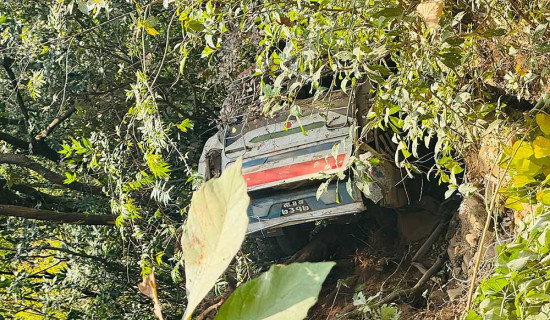
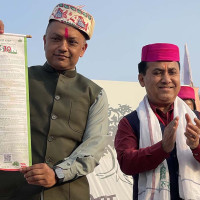
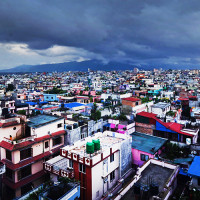
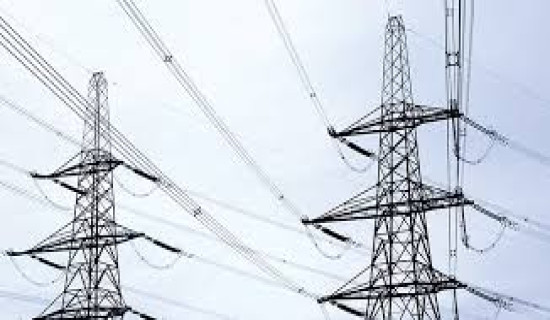
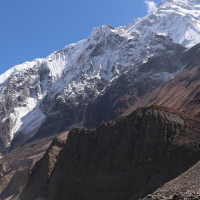
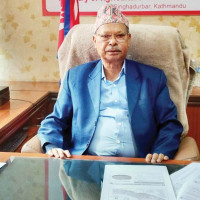
-original-thumb.jpg)






